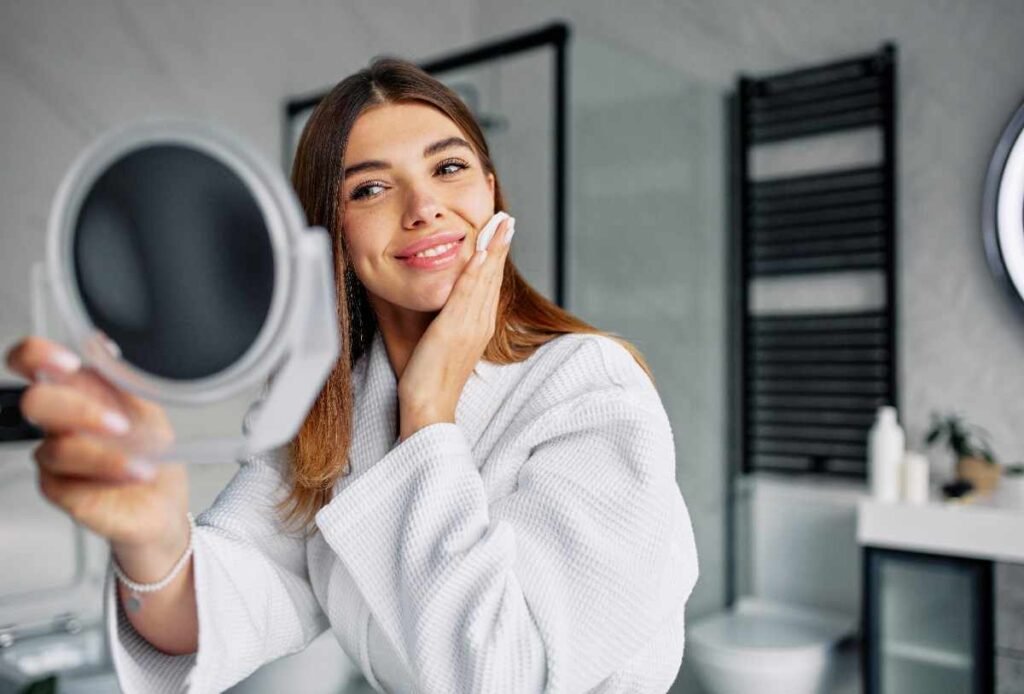Welcome, skincare enthusiasts! If you’re anything like me, taking care of your skin is more than just a daily task, it’s a passion. We all know that having a regular skincare routine is necessary for maintaining healthy and glowing skin. But with so many products and techniques available, it can be hard to figure out the best routine for your specific skin type. That’s why I’ve mentioned together this blog post, to share the essential steps that you should include in your daily skincare routine, no matter what skin type you have. So let’s dive in!
This blog will help you to take care of your skin, no matter what your skin type is whether oily, dry, combination, or sensitive. We’ll share simple and effective steps just for you. Get ready to discover the best way to keep your skin looking its best!

1. Understanding Different Skin Types
Normal Skin: Characteristics and needs.
- Characteristics: Balanced, not too oily or dry, with a smooth texture and minor spots.
- Needs: Regular cleansing and moisturizing. Apply sunscreen to protect your skin from sun damage.
Dry Skin:
- Characteristics: tight, or rough texture with possible redness or irritation.
- Common Issues: likely to experience dryness and irritation.
- Needs: good, hydrating moisturizers, and gentle, non-stripping cleansers.
Oily Skin:
- Characteristics: Shiny appearance, larger pores, and frequent acne.
- Common Concerns: Excess oil production.
- Needs: Oil-free, oil-control products and need regular exfoliation.
Combination Skin:
- Characteristics: A mix of dry, oily, or normal areas, typically with an oily zone forehead, nose, chin, and drier cheeks.
- Balancing Issues: Managing different areas with varying needs.
- Needs: Balanced products that address both oily and dry zones without over-drying or adding excess oil.
Sensitive Skin:
- Characteristics: Easily irritated, Likely to redden, burning, or itching.
- Special Care: Needs gentle, hypoallergenic products and little exposure to potential irritants.
2. The Essential Steps of a Daily Skincare Routine
Cleansing
Importance:
Cleansing is necessary for removing dirt, oil, and other impurities, allowing your skin to breathe and absorb other products effectively.
Toning
Toning helps balancing the skin’s pH, refine pores, and remove any remaining impurities after cleansing.
Exfoliating
Frequency and Benefits:
Exfoliation removes dead skin cells from skin, boosts cell regeneration and enhances skin brightness Typically, 1-2 times a week is preferred, depending on your skin’s sensitivity.
Moisturizing
Role:
Moisturizers help in maintaining the skin’s barrier, keeping it hydrated and protected from environmental factors.
Sun Protection
Importance:
SPF protects your skin from harmful UV rays, preventing from sun damage, premature aging, and skin cancer.
3. Additional Tips and Considerations
Hydration:
Importance: Drinking plenty of water helps in keeping your skin hydrated from the inside out, promotes a healthy and glowing skin. Aim for at least 8 glasses of water a day to support overall skin health.
Diet:
Impact: Your diet plays a vital role in skin health. Foods which are rich in antioxidants, vitamins, and healthy fats like fruits, vegetables, and nuts can improve skin texture and tone. Minimize your intake of processed foods and excess sugar.
Lifestyle Factors:
- Stress: High stress levels can lead to skin issues like acne and skin rash. Handle stress by using relaxation methods like meditation, deep breathing, and yoga.
- Sleep: sufficient sleep 7-9 hours a night is necessary for skin repair and regeneration. Poor sleep may contribute to dullness and premature aging.
- Exercise: Regular physical activity boosts blood circulation, which helps deliver nutrients to the skin and flush out toxins. Just remember to cleanse your skin after sweating.
4. Customizing Your Routine
Layering Products:
How to layer products effectively.
- Cleanser: Start with a clean face. Use a ideal cleanser for your skin type.
- Toner: Apply toner to balance pH and prepare your skin for the next steps.
- Serum: Use serums with active ingredients like vitamins, and antioxidants, to target specific concerns.
- Moisturizer: Lock’s hydration with a moisturizer suited to your skin type.
- Sunscreen: Finish with SPF during the day to protect your skin from UV damage.
Seasonal Adjustments:
Spring/Summer:
- Hydration: choose a lighter, hydrating products to avoid greasy feel.
- Sun Protection: Use a high SPF and consider sunscreens with added hydration.
Fall/Winter:
- Hydration: Switch to richer, more emollient moisturizers to fights dryness and maintain moisture.
- Cleansing: Use gentler, non-stripping cleansers to prevent irritation.
5. Common Mistakes to Avoid
Over-Exfoliating
- Explanation: Exfoliation is important for removing dead skin cells and Boost’s skin cell regeneration, but doing it too frequently or using harsh exfoliants can lead to irritation, redness, and damage to the skin.
- How to Avoid: Stick to exfoliating 1-3 times a week depending on your skin type. Choose gentle exfoliants suited for your skin, for example, chemical exfoliants like AHAs and BHAs for sensitive skin, physical exfoliants with fine grains for oily skin. Monitor your skin’s reactions and adjust the frequency as needed.
Skipping Sunscreen
- Explanation: Sunscreen is necessary for protecting the skin from harmful UV rays that can cause premature aging, pigmentation, and increase the risk of skin cancer. Skipping sunscreen, even on cloudy days or indoors, can adjust your skin’s health.
- How to Avoid: include sunscreen into your morning routine every day. Choose a broad-spectrum SPF of at least 30 that suits your skin type. For added convenience, consider products with SPF integrated into your moisturizer or foundation.
Using products that aren’t meant for your skin type
- How to Avoid: Identify your skin type and choose products which specifically designed for it. Read ingredient labels and product descriptions carefully. If unsure, consult a dermatologist or skincare professional.
- Explanation: Using products that are not formulated for your specific skin type can lead to ineffective results or increase existing issues. For example, using a heavy, oil-based moisturizer on oily skin can clog pores.